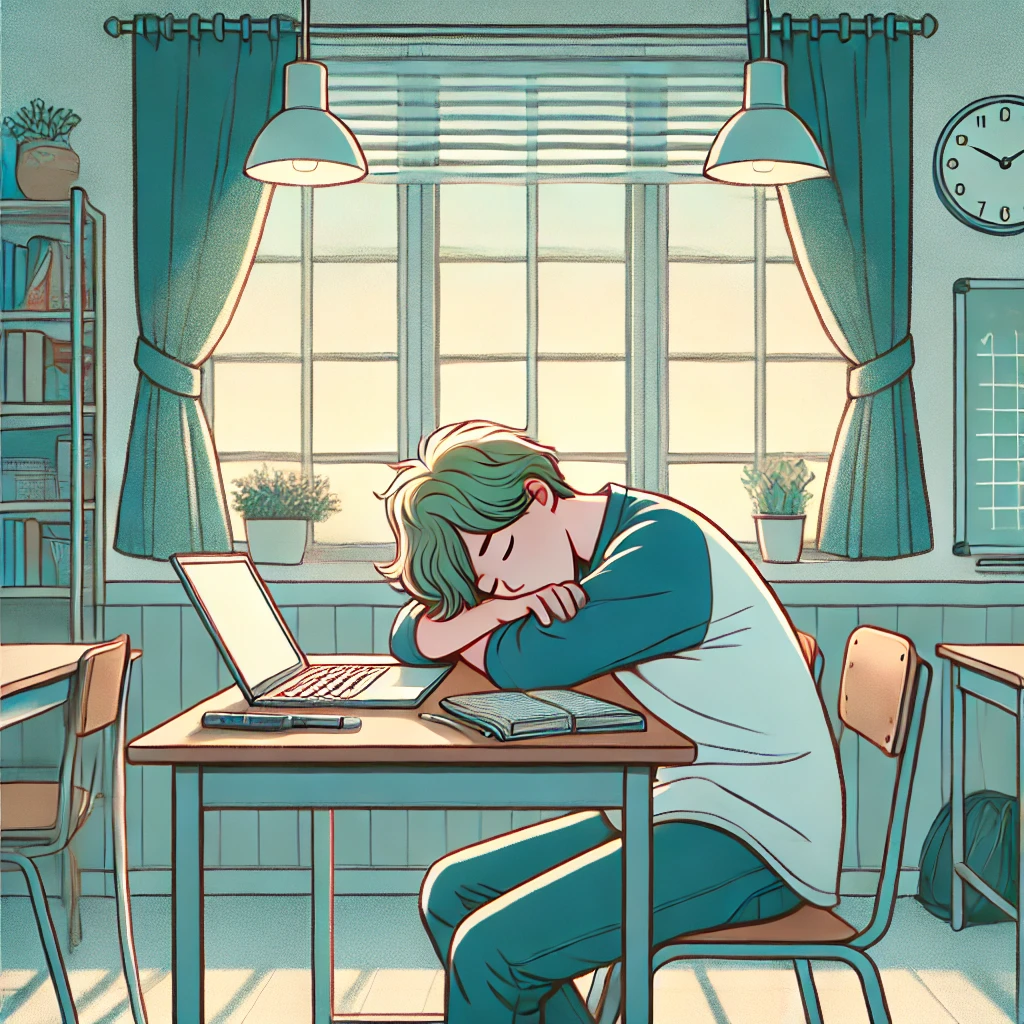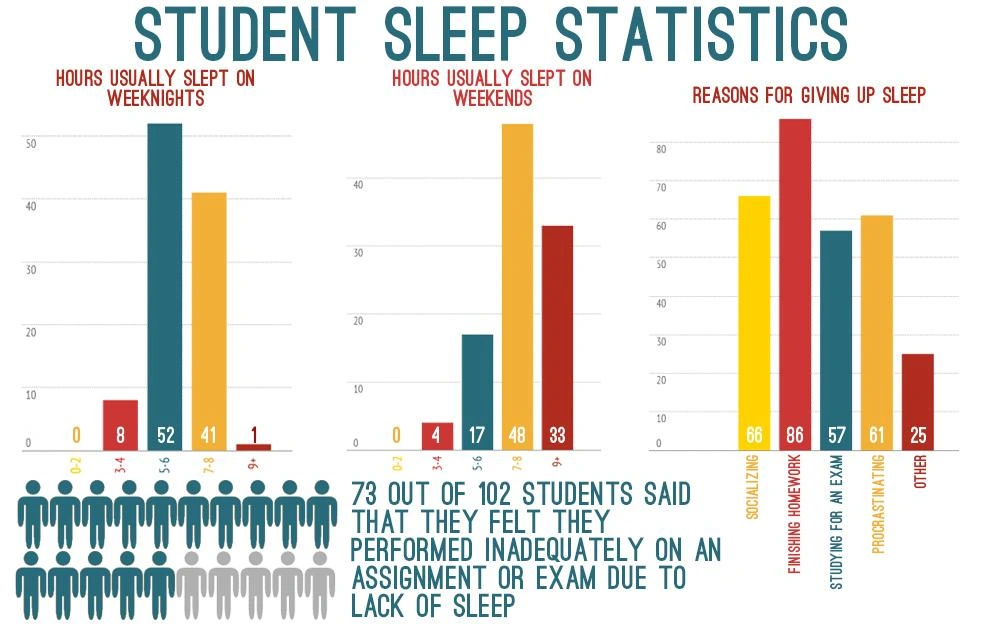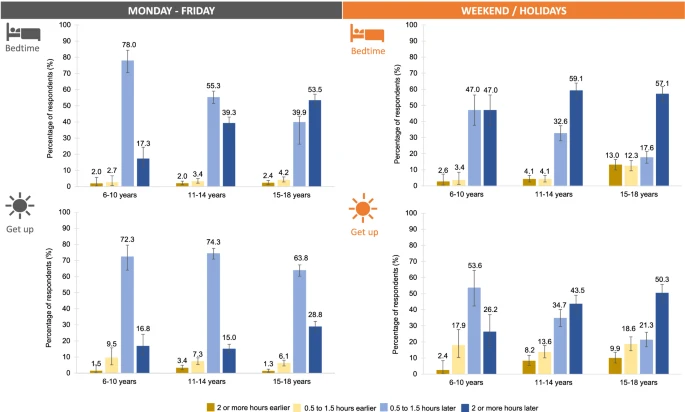Update: This article was last updated on 12th December 2024 to reflect the accuracy and up-to-date information on the page.

Teens frequently experience teen fatigue, a widespread issue that affects a significant number of adolescents. Understanding the causes of this fatigue and finding ways to manage it is crucial for the well-being and academic success of teens. This blog will help you explore the various factors contributing to teen fatigue, its impact, practical strategies, and what can be done to solve this.
Why am I so tired after school? This is a question that resonates with many teens, and it’s often a sign of teen fatigue, a prevalent issue.
The National Sleep Foundation reports that approximately 87% of high school students in the United States don’t get the recommended 8-10 hours of sleep on school nights. This lack of sleep can lead to about 20-30% of teens experiencing excessive daytime sleepiness, which can hinder their ability to concentrate and perform in school.
While it’s easy to attribute this fatigue to a busy schedule, there’s more to it than meets the eye. From hormonal changes to lifestyle habits, several factors contribute to teen fatigue. Understanding these causes is the first step for parents and educators to help teens develop strategies to boost energy levels and overall well-being.
Example: Consider the story of Emily, a high school junior who struggles to stay awake during her afternoon classes. She often feels so tired that she can barely focus on her homework, leading to a cycle of stress and poor academic performance. Emily constantly wonders, “Why am I so tired after school?” Emily’s experience is not unique, but it highlights the widespread nature of this issue.
You May Love This: The Importance of Self-Care for Parents
1. Biological Factors Contributing to Teen Fatigue

Many students often complain to their parents, asking, “Why am I always tired after school?” This fatigue can result from various factors, such as the mental and physical demands of a full day of learning, inadequate sleep, poor nutrition, or stress. Balancing schoolwork, extracurricular activities, and social pressures can leave students feeling drained. Understanding the root causes of this tiredness and implementing healthier habits, such as better sleep routines, balanced meals, and stress management, can help students feel more energized after school.
1. Circadian Rhythms and Sleep Patterns
The body’s internal clock shifts during adolescence. Teens naturally feel more awake late at night and sleepy in the morning. This change, combined with early school start times, often means teens don’t get enough sleep.
2. Growth and Development
Puberty involves significant physical changes that increase the need for sleep. The body needs extra rest to support healthy growth..
3. Hormonal Changes
Changes in hormones, especially melatonin, which regulates sleep, make it harder for teens to fall asleep early. Melatonin is released later in the evening for teens.
You May Love This: Effects of Social Media on Mental Health of Kids
2. Psychological and Emotional Contributors
1. Stress and Anxiety
Why are teenagers so tired? Academic pressures, peer pressure, social issues, and personal problems such as family issues or relationship troubles can cause stress and anxiety, disrupting sleep and leading to fatigue. Teens report high levels of stress, with school being the primary source.
2. Mental Health Issues
Conditions like depression and anxiety are linked to sleep problems and fatigue. Nearly one in five teens experience a mental health disorder, which can greatly affect their energy levels.
3. Cognitive Load
The mental demands of schoolwork and activities can lead to cognitive overload, a state where the brain is working at full capacity and can’t process any more information, leading to mental fatigue. Constantly switching between tasks can exhaust a teen’s mental energy.
You May Love This: Coping Mechanisms in the Digital Age: Guide to Emotional Wellness
3. Lifestyle Factors Affecting Energy Levels

1. Sleep Hygiene
Good sleep habits are crucial. Irregular sleep schedules and too much screen time before bed can disrupt sleep quality and lead to fatigue.
2. Diet and Nutrition
Balanced nutrition is essential for maintaining energy. Consuming too much sugar, caffeine, and junk food can cause energy crashes.
3. Physical Activity
Teenage tiredness is often linked to an imbalance in physical activity. Regular exercise can boost energy, but too much or too little exercise can lead to fatigue. Balance is key.
4. Substance Use
Caffeine and energy drinks can give a temporary boost but often lead to a crash. Alcohol and drugs can disrupt sleep and cause chronic fatigue.
You May Love This: How to Help Kids with Test Anxiety

This graph illustrates statistics about sleep schedules, highlighting that many students get insufficient sleep on average weeknights.
4. Environmental and Societal Influences
1. School Schedules
Many teenagers feel tired after school due to early school start times and long, demanding days. These factors contribute significantly to teen fatigue. Starting school later could help teens get more sleep and feel better.
2. Extracurricular Commitments
Balancing schoolwork, activities, jobs, and social life can overwhelm teens and reduce their rest time.
3. Technology and Media Consumption
Nowadays, teenagers feel tired after school due to various factors, including too much screen time. Too much screen time, especially before bed, can interfere with sleep. The blue light from screens suppresses melatonin, making it harder to sleep.
You May Love This: Improving Concentration in Children: Identifying Common Causes and Effective Solutions
5. Recognizing the Signs of Excessive Fatigue
1. Physical Symptoms
Fatigue can cause headaches, muscle soreness, frequent illness, and general tiredness. These symptoms indicate that a teen isn’t getting enough restful sleep.
2. Emotional and Behavioral Signs
Fatigue can lead to irritability, mood swings, and lack of motivation. Teens may also show signs of depression or anxiety.
3. Academic and Social Impact
Fatigue can affect school performance, leading to lower grades and less class participation. Socially, tired teens may withdraw from activities and friends.
You May Love This: Parenting Through the Teen Years: Nurturing Independence and Responsibility
6. Strategies for Managing and Alleviating Teen Fatigue
1. Improving Sleep Hygiene
- Consistent Sleep Schedule: Encourage teens to go to bed and wake up at the same time every day.
- Relaxing Bedtime Routine: Establish calming activities like reading before bed.
- Limit Screen Time: Reduce screen time for kids to use at least an hour before bedtime.
2. Stress Management Techniques
- Mindfulness and Meditation: These practices can help manage stress and improve sleep.
- Time Management: Effective time management can reduce stress and prevent overload.
3. Healthy Lifestyle Choices
- Balanced Diet: Encourage a diet with fruits, vegetables, proteins, and whole grains.
- Regular Exercise: Promote moderate physical activity.
- Avoiding Substances: Educate about the effects of caffeine and energy drinks on sleep.
4. Creating a Supportive Environment
- Parental Support: Parents can promote Daily routine habits for a healthy and happy life and provide emotional support.
- School Policies: Advocate for later start times and reduced homework to improve sleep and health.

This graph by https://www.nature.com/ shows COVID-19-induced changes in children’s and adolescents’ sleep rhythms, with delayed bedtimes and less-shifted wake times, especially on weekends, with older teens experiencing the most delay.
7. Strategies for Managing and Alleviating Teen Fatigue
1. Identifying Serious Issues
If fatigue is severe and persistent, it may indicate a health issue, such as a sleep disorder or mental health condition. Look for significant changes in mood, behavior, or performance.
2. Consulting Healthcare Providers
Seek help from doctors, sleep specialists, or mental health professionals if fatigue affects daily life. They can diagnose and treat underlying issues.
3. Working with Schools
Work with school counselors and administrators to find solutions like flexible schedules for teens struggling with fatigue.
You May Love This: Parenting Hacks for a Stress-Free Morning Routine For Kids
Books and Articles
- “The Teenage Brain” by Frances E. Jensen
- “Why We Sleep” by Matthew Walker
Conclusion
Teen fatigue is a common issue with many causes, including biological changes, stress, lifestyle habits, and environmental factors. By understanding these factors and using practical strategies, teens can manage their fatigue and improve their well-being. Parental support, school accommodations, and professional help are essential in this process.
Looking for a comprehensive parenting guide to ensure you are on the right track? Explore a wealth of parenting wisdom and educational insights in Moonpreneur’s blogs. Additionally, you can join our programs that nurture the next generation of innovators. Book a free trial now!

























